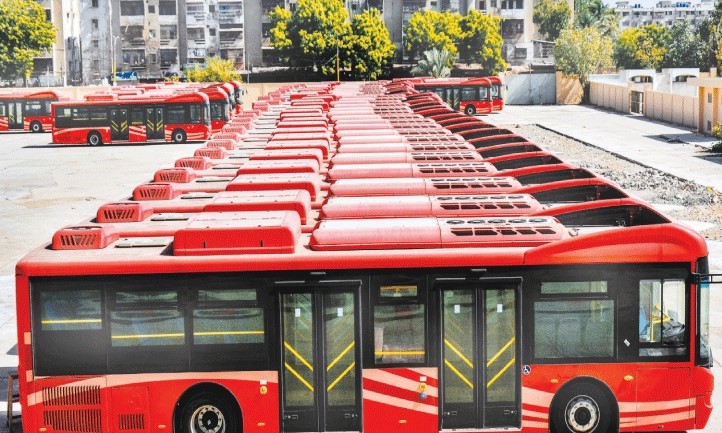Karachi's Public Transit Crisis: 15,000 Buses Needed

Karachi's Public Transit Crisis: 15,000 Buses Needed
Karachi, the bustling metropolis of Pakistan, finds itself in the throes of a significant transportation crisis. A recent report from the World Bank sheds light on the urgent need for a comprehensive transport infrastructure in the city.
The report underscores that Karachi's sprawling population necessitates a fleet of 15,000 buses to adequately serve its transportation needs. However, the current operational bus fleet falls woefully short of this requirement, with a meager 1,029 buses traversing the city's roads.
Among these operational buses, 240 are part of the People's Bus Service, 100 belong to the Bus Rapid Transit (BRT) system, and 689 are aged buses managed by the private sector. This severe shortage of buses compounds the daily commuting challenges faced by Karachi's residents.
To bridge this immense gap in public transportation, the World Bank report strongly recommends the acquisition of an additional 13,000 public transport buses for Karachi. This clarion call underscores the critical importance of swiftly expanding the city's transportation infrastructure.
Recognizing the monumental task at hand, Muhammad Younus Dagha, the caretaker provincial minister of finance, revenue, and planning and development in Sindh, has directed officials to explore avenues for public-private partnership projects. Encouraging the active involvement of the private sector is deemed essential to overcome the transportation deficit.
In a proactive move to engage the private sector, the transport department is considering a plan to offer easily accessible loans to local private transporters. These loans may carry zero markup rates, rendering it more feasible for local transporters to augment their bus fleets.
Another proposal on the table involves extending soft loans to local transporters upon their acquisition of new buses. Initially, these buses would be registered under the Sindh government's name until the transporters repay the loan installments. This initiative aims to empower local transporters by enabling them to procure new buses with government support, ultimately enhancing public transportation services within the city.
The World Bank's report brings into sharp focus the acute scarcity of buses within Karachi's public transport system. Effectively addressing this shortfall necessitates concerted efforts involving both the public and private sectors, including innovative financing solutions and collaborative partnerships. Karachi's residents eagerly anticipate an improved transport system that can alleviate their daily commuting struggles.
Karachi transportation crisis
Karachi public transport
World Bank Karachi report
Karachi bus shortage
Karachi transportation infrastructure
Karachi publicprivate partnership
Karachi transport loans
Karachi public transportation deficit
Karachi commuting challenges
Karachi transport
Related Auto News Updates
Latest Discussions
Comments














Add a Comment "Karachi's Public Transit Crisis: 15,000 Buses Needed"